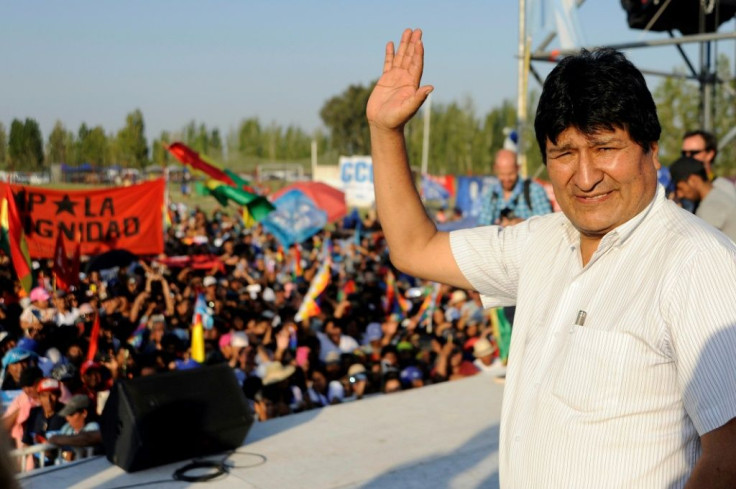Exiled Morales Pulling Bolivian Political Strings As Polls Loom
From exile in Buenos Aires, former leftist president Evo Morales continues to influence Bolivian politics and is plotting his party's return to power in September elections, analysts say.
Though banned from running in the poll and facing arrest if he returns, the 60-year-old -- Bolivia's first indigenous president -- is masterminding opposition to right-wing interim leader Jeanine Anez.
"At this time when Evo Morales is in exile, outside of power, he has become a kind of kingmaker," political scientist Carlos Cordero told AFP.
Morales last year hand-picked economist Luis Arce as the man who can win back the presidency for his Movement for Socialism (MAS) party.
To do so he faced down grassroots members who favored former foreign minister David Choquehuanca or young coca-growers' leader Andronico Rodriguez.
Arce, however, has slowly won over the doubters and is riding high in opinion polls, which if confirmed in the September 6 elections, would hand the presidency back to MAS a year after Morales' tumultuous resignation.
The polls give Arce 33 percent and centrist ex-president Carlos Mesa just over 18 percent, while Anez trails with nearly 17 percent.
Maria Teresa Zegada, a sociologist at the state-run Universidad Mayor de San Simon, says Morales is a key player in the electoral campaign, despite his absence.
"I believe that he will continue to play an important role, as long as he continues to be a polarizing factor in the country's politics. There are important sectors that support MAS and that is where Morales' presence lies."
Ahead of the pandemic, the ex-president frequently convened meetings with MAS leaders in Argentina, but that direct communication has been frustrated by the pandemic lockdowns.
These days he issues instructions via social media.
"We will come back stronger and we will restore freedom and dignity to the Bolivian people," said a message on his Twitter account.
Morales on Wednesday condemned what he said was an attempt by Anez to get the courts to outlaw his party and remove Arce from the electoral race.
"The de facto government initiated a judicial strategy with political ends to disqualify our candidate and MAS and prevent us from participating in the elections," he tweeted.

Anez has accused Morales of conspiring to damage her electoral chances by sending overpriced Spanish ventilators for COVID-19 patients into the country as part of a relief operation during the pandemic.
Zegada said Morales has benefited from the errors and scandals that have tainted his adversaries in power.
Morales fled the country after three weeks of protests over his controversial re-election in October 2019 in a poll in which he was constitutionally barred from participating.
He had tried to cling to power but lost the backing of the country's military after an Organization of American States audit found clear evidence of election fraud.
He initially fled to Mexico, which sent a government plane to pick him up, before settling later in Argentina, home to a large Bolivian population.
Most of Morales' cabinet fled with him, leaving behind a power vacuum in the bitterly divided country. Anez -- a hitherto little known conservative senator -- assumed the presidency the following month.
Her government accuses him of sedition and terrorism for allegedly urging his supporters to lay siege to major cities such as La Paz.
However, Morales, a member of the Aymara indigenous community, has built up a "messianic leadership -- which is why his voice continues to carry so much weight, even in exile," said Cordero, a professor at the Catholic University in La Paz.
"These leaders become political professionals... Their life is simply doing politics, that's the psychological profile of these people," he said.
Morales is a colossus of his own party, whose support comes mainly from indigenous people and poor farmers, and there is no one in the party ranks to overshadow him.
According to Zagada, his broader influence has waned, however.
"We have a gravitating figure, but at the same time one that is worn out, and he is no longer the figure he was when he was president of the country," she said.
Under Morales' 14-year rule, Bolivia's 36 indigenous groups -- which account for 62 percent of the country's more than 11 million people -- were constitutionally recognized.
The country also reduced extreme poverty from 38 percent to 17 percent, and achieved an average economic growth rate of 4.8 percent.
© Copyright AFP 2024. All rights reserved.




















